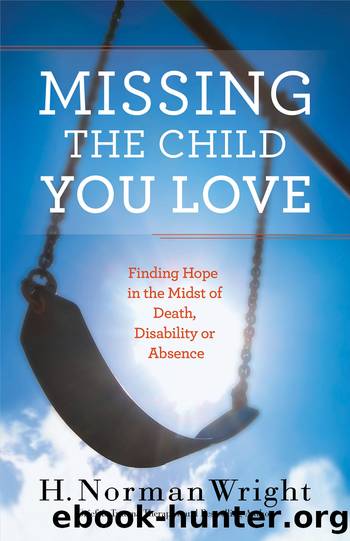Missing the Child You Love by H. Norman Wright

Author:H. Norman Wright
Language: eng
Format: epub
ISBN: 9780830770243
Publisher: Gospel Light
The Lost Child
There are many ways in which parents can âloseâ a child, as well as many ways for a child to become lost. One loss is referred to as an ambiguous loss. There is an incompleteness or uncertainty about it. And itâs one of the most devastating because it isnât clear or complete. We all want certainty, even if the news is bad.
There are two basic kinds of ambiguous loss. One is when the family member is physically present in the family but psychologically gone or absent. We think of those who are older and have Alzheimerâs or have suffered a stroke; but it could also be a child who suffers a mental illness or suffers a head injury and wakes up a different person.
The other type of ambiguous loss is when the person is still alive or present psychologically, but absent physically, such as a missing child. When this happens to a family, parents and others feel totally helpless. Parents become immobilized, having no way to solve the problem. The uncertainty leaves the entire family crippled. Itâs as though they are frozen in place.
And even though this loss may continue for years, they are denied the rituals we perform for a definite loss. How can you have a funeral or a memorial service when there is no death certificate?
Support and recognition for this loss are very minimal because others do not recognize it or they withdraw from it. One of the problems is that, unlike the death of a child, ambiguous loss may never allow you to move through the detachment that helps to bring closure.1
The confusion of ambiguous loss impedes the grieving process. It is one of the most stressful types of lost-child losses.
Runaways
Some children run away because of drug and alcohol abuse. When teens and preteens get involved in substance abuse, they may leave home to hide it from their parents. These are children who are using much more than their parents know or could imagine. They want to use even more drugs freely and openly, so they run away.
Feelings of failure can also cause children to leave home. Some run away because itâs easier to live on their own than to live in a critical atmosphere.
Some children have left home because they were caught cheating in school or became pregnant and were afraid of their parentsâ disapproval.2
Letâs return to ambiguous loss when a child disappears from home for one reason or another.
Download
This site does not store any files on its server. We only index and link to content provided by other sites. Please contact the content providers to delete copyright contents if any and email us, we'll remove relevant links or contents immediately.
The 5 Love Languages: The Secret to Love That Lasts by Gary Chapman(9815)
The Space Between by Michelle L. Teichman(6941)
Assassin’s Fate by Robin Hobb(6221)
Wiseguy by Nicholas Pileggi(5787)
Everything Happens for a Reason by Kate Bowler(4743)
Gerald's Game by Stephen King(4654)
Pillow Thoughts by Courtney Peppernell(4284)
A Simplified Life by Emily Ley(4163)
The Power of Positive Thinking by Norman Vincent Peale(4065)
Harry Potter and the Prisoner of Azkaban (Book 3) by J. K. Rowling(3360)
Resisting Happiness by Matthew Kelly(3341)
Girl, Wash Your Face by Rachel Hollis(3282)
Being Aware of Being Aware by Rupert Spira(3276)
The Secret Power of Speaking God's Word by Joyce Meyer(3220)
The Code Book by Simon Singh(3189)
More Language of Letting Go: 366 New Daily Meditations by Melody Beattie(3030)
Real Sex by Lauren F. Winner(3023)
Name Book, The: Over 10,000 Names--Their Meanings, Origins, and Spiritual Significance by Astoria Dorothy(2987)
The Holy Spirit by Billy Graham(2953)
